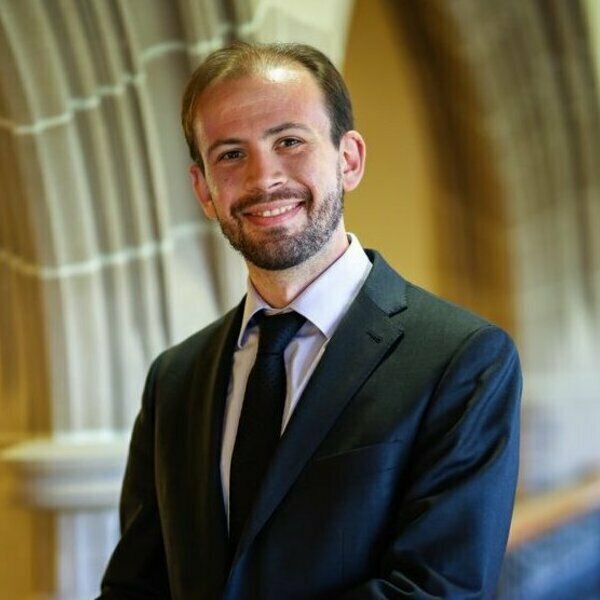Joseph Graziano ’23 J.D. wins Smith-Doheny Legal Ethics Writing Competition

Joseph Graziano, a member of Notre Dame Law School’s Class of 2023, is the winner of this year’s Smith-Doheny Legal Ethics Writing Competition.
Graziano’s paper, “The Virtue Model of Legal Ethics,” analyzed the ethical underpinnings of the American Bar Association’s Model Rules of Professional Conduct.
He explains that the Model Rules contain representations of three approaches to ethical reasoning: virtue ethics, imperative ethics, and casuistic ethics. The preamble and scope present a virtue-based vision of the moral lawyer, while the Rules themselves read like a set of imperatives that draw clear boundaries between what is and is not permissible. Meanwhile, the MPRE presents casuistic examples for the lawyer’s consideration.
In his paper, Graziano suggests restructuring ethical training by using the virtues reflected in the preamble and scope of the Model Rules as a foundation.
“Education in legal ethics often consists of reading rules and cases of lawyers whose actions were objectively deplorable, but who yet never quite violated a rule. If the goal of legal ethics is to make lawyers moral, the means currently used falls short,” he writes. “A merely legalistic approach trains lawyers how to get away with questionable but technically ethical action rather than how to behave ethically.”
Richard W. Garnett, the Paul J. Schierl/Fort Howard Corp. Professor of Law, was a reader for the Smith-Doheny Legal Ethics Writing Competition this year.
“It is a pleasure for Notre Dame Law School to honor Joseph’s thoughtful paper,” Garnett said. “Notre Dame has long been a leader, in keeping with our Catholic mission and character, in legal ethics, led by great scholars like Robert Rodes and Tom Shaffer.”
As a third-year law student, Graziano was involved at Notre Dame Law School as chair of the Honor Council, president emeritus of the St. Thomas More Society, senior articles and symposium editor of the Notre Dame Law Review, and scholarship coordinator of the Federalist Society. He was also a Sorin Fellow of the de Nicola Center for Ethics and Culture and a student fellow of Notre Dame Law School’s Religious Liberty Initiative.
He spent the summer after his first year of law school as a legal intern with the Becket Fund for Religious Liberty and as research assistant to Notre Dame Law Professor Paolo Carozza. He spent the following summer as a summer associate at Kirkland & Ellis in New York. His next stop will be a clerkship with Judge Stephanos Bibas of the U.S. Court of Appeals for the Third Circuit.
The Smith-Doheny Legal Ethics Writing Competition is an annual contest, first started in 1997, that looks for the best papers on legal ethics among U.S. and Canadian law students. Selections are made through a blind review process and winners receive a $2,500 cash prize.
Originally published by at law.nd.edu on June 05, 2023.
Latest Research
- ‘A special challenge’: German studies scholar wins National Humanities Center fellowship for research on medieval womenFor CJ Jones, the joy of research is not the answers but the journey. And the next step on that journey is a fellowship with the National Humanities Center. …
- Notre Dame Lead Innovation Team partners with local WIC program to identify, prevent lead poisoning in childrenB.A.B.E. store “shoppers” now have something new to help their families: free lead screening kits offered by the University of Notre Dame’s Lead Innovation Team.
- Notre Dame Welcomes Ninth Cohort of Warrior-Scholars for Transformative Academic JourneyNOTRE DAME, IN – The University of Notre Dame recently concluded its ninth successful Warrior-Scholar Project (WSP) boot camp, hosting 34 dedicated Warrior-Scholars from June 21st to 28th. This intensive, week-long academic residency provided transitioning service members and veterans…
- Entrepreneurship and Empowerment in South Africa study abroad program celebrates 25 yearsThis year, the Entrepreneurship and Empowerment in South Africa (EESA) program marked its 25th year of operation. EESA is a six-week summer study abroad program that enables students to help historically…
- Vatican honors Martin and Carmel Naughton with papal awardCarmel…
- Brain tumor growth patterns may help inform patient care managementAssistant Professor Meenal Datta (University of Notre Dame/Wes Evard) A team of researchers from the University of Notre Dame, Harvard Medical School/Massachusetts General Hospital, and Boston University has developed a technique for measuring a brain tumor’s mechanical force and a new model to estimate how much brain tissue a patient has lost.













